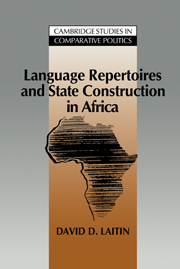8 - Shaping the 3 ± 1 language state
Published online by Cambridge University Press: 03 May 2010
Summary
Nationalist movements in most African countries achieved their goal of political independence a generation ago, yet cultural independence remains elusive. Africa's failure to assert its cultural autonomy manifests itself most sharply in language, since facility in the language of the former metropole remains a key to elite status throughout much of Africa. Meanwhile, the primary languages of nearly all Africans, while socially viable, continue to have low status in education, administration, and big business. In light of the feeling of dependency that follows from their linguistic situation, not to mention despondency at the fact that high linguistic barriers separate the citizen from the state, African policymakers, intellectuals, and ordinary citizens have asked themselves, throughout the last quarter-century – as I have asked throughout this book – What might be the role of indigenous languages in modern Africa?
A genre of recent writings by African intellectuals demonstrates these deep-seated feelings about the role of languages in modern African society. The best-known of this genre is Ngugi wa Thiong'o's Decolonising the Mind: The Politics of Language in African Literature (1986), where this master of the English language renounced any future creative work in the language of the colonial state. But the themes that Ngugi raised are pervasive ones in intellectual discourse within Africa. A continuing theme in the annual conferences of the Linguistic Association of Nigeria for three consecutive years, 1985 (in Zaria), 1986 (in Maiduguri), and 1987 (in Port Harcourt), has been the passionate search for a single indigenous national language but in the context of preserving all indigenous languages as well as multilingual repertoires (Emenanjo, 1990, vi).
- Type
- Chapter
- Information
- Language Repertoires and State Construction in Africa , pp. 149 - 164Publisher: Cambridge University PressPrint publication year: 1992
- 1
- Cited by



